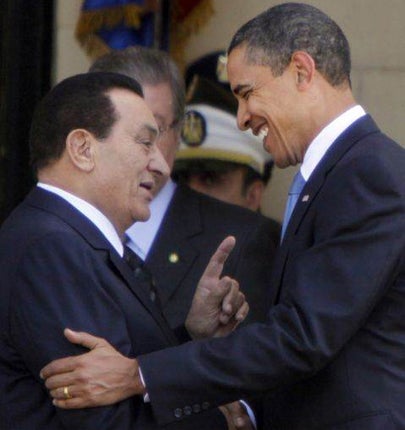Rupert Cornwell: Egyptian drama that has proved beyond America's control

Your support helps us to tell the story
From reproductive rights to climate change to Big Tech, The Independent is on the ground when the story is developing. Whether it's investigating the financials of Elon Musk's pro-Trump PAC or producing our latest documentary, 'The A Word', which shines a light on the American women fighting for reproductive rights, we know how important it is to parse out the facts from the messaging.
At such a critical moment in US history, we need reporters on the ground. Your donation allows us to keep sending journalists to speak to both sides of the story.
The Independent is trusted by Americans across the entire political spectrum. And unlike many other quality news outlets, we choose not to lock Americans out of our reporting and analysis with paywalls. We believe quality journalism should be available to everyone, paid for by those who can afford it.
Your support makes all the difference.A clearly disappointed Obama administration was silent last night after President Hosni Mubarak confounded every expectation by refusing to step down. His defiance only deepens the quandary facing Washington: how to encourage democracy in Egypt while protecting its interests in the broader region – when it has scant, if any, power, to shape events.
All day, President Obama held urgent consultations with his top national security advisers, but could do little more than monitor events from afar. Middle East experts here stressed however that despite last night's developments, the process of change was only beginning. "The Mubarak era is basically over," one said.
"We are witnessing history unfold," Mr Obama said during a visit to Michigan, his remarks broadcast live on Egyptian state TV.
A moment of "transformation" was taking place, with the people of Egypt calling for change, young people in the forefront. America, he said, would do all it could to support an "orderly and genuine" move to democracy there.
From the outset, Washington has struggled to keep pace with events in Egypt, first seeming to back President Mubarak, then signalling that it wanted him to step down quickly and hand power to his Vice-President, Omar Suleiman – only for it to become clear that as far as the protesters were concerned, this merely would be to exchange one unpopular autocrat for another.
Thus far, chants of "Down with the USA" have been conspicuous by their absence in Cairo. But as the administration in Washington seemed to endorse a solution that fell short of popular demands, the mood on the streets started to shift against the US, even as the pressure for real change grew irresistible.
But then the Obama team seemed to embrace the protesters' cause again. Earlier yesterday, Leon Panetta, the CIA director, had told a Congressional hearing that his understanding was that the Egyptian President would very soon step down. The immediate silence from the White House and the State Department after Mr Mubarak spoke was a sign of the delicacy of its position.
Washington's task is daunting. Whatever its unspoken preferences, the administration accepts that a more democratic system is essential for a long-term, stable Egypt, and that purely cosmetic change is no longer enough.
But its power is limited. "This crisis has shown not only how little the US can influence events in Egypt, but how little it knows," said Richard Haass, former State Department policy chief and president of the Council on Foreign Relations. That ignorance extended to how much power Mr Mubarak is ceding to his Vice-President.
But that is only the immediate problem. In the longer term, the US must weigh the impact of the crisis on its key interests in the region: containing the spread of radical Islam and fighting terrorism, ensuring the flow of oil, and the security of its key ally Israel.
"In these situations," said Robert Kagan, a Middle East expert at the Brookings Institution, "it's very difficult for the US to get it right. The administration has to be firm that the emergency law must be lifted, and that the opposition must be brought into the government process."
Join our commenting forum
Join thought-provoking conversations, follow other Independent readers and see their replies
Comments